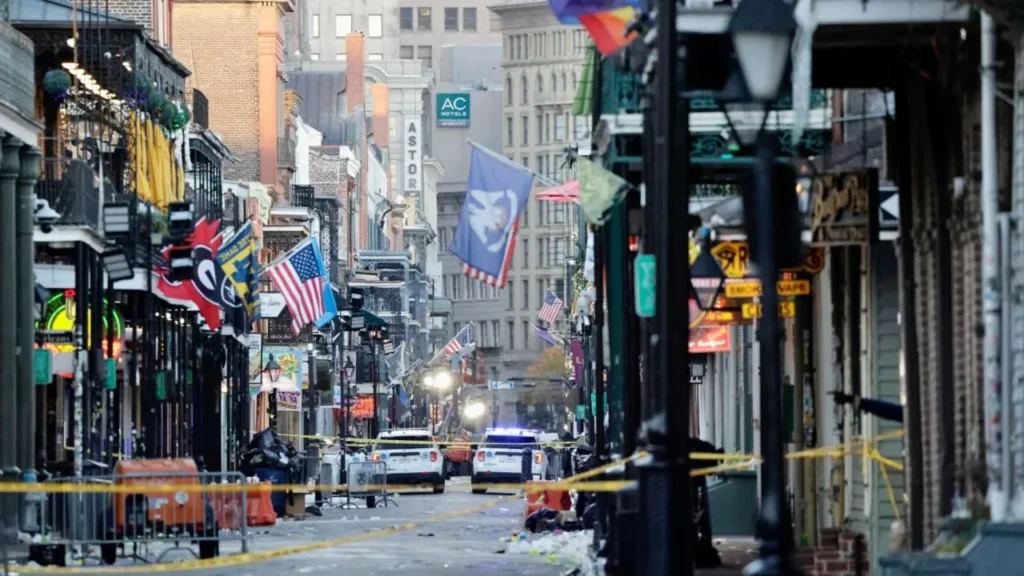
The tragic attack in New Orleans that claimed 15 lives has shocked the world, and the aftermath of this horrific event has left many searching for answers. Recently, Shamsud-Din Jabbar’s brother made a public statement that sheds new light on the motive behind the attack. He claims that it was radicalization, not religion, that led his brother to commit such a devastating act. This important statement challenges common assumptions and invites us to rethink how we understand violent extremism.
In this blog, we’ll break down what Shamsud-Din Jabbar’s brother said, explore the concept of radicalization, and discuss how this insight can help us prevent future violence.
The Tragic Attack in New Orleans
On the day of the attack, New Orleans was hit by an act of terrorism that claimed 15 innocent lives. In the wake of this senseless violence, many people began questioning the motivations behind such an attack. Initially, there was a strong focus on Shamsud-Din Jabbar’s religious affiliations. However, his brother’s recent statement shifts the focus from religion to radicalization, offering a clearer perspective on the root cause of the tragedy.
Shamsud-Din Jabbar’s Brother’s Powerful Statement
In a heartfelt and unexpected move, Shamsud-Din Jabbar’s brother addressed the public. He made it clear that radicalization, not religion, was responsible for his brother’s violent actions. According to him, Jabbar was drawn into a dangerous ideology that twisted religious beliefs to justify violence.
His statement serves as a reminder that the real problem isn’t religion itself, but rather the radicalization process—a dangerous journey in which individuals are manipulated into adopting extremist views. This important distinction emphasizes the need to address the deeper issues surrounding radicalization.
What Is Radicalization?
Radicalization is the process by which individuals adopt extreme beliefs, often leading them toward violent actions. It doesn’t happen overnight. Instead, it can take years, with individuals being influenced by personal struggles, isolation, or exposure to extremist ideologies.
In the case of Shamsud-Din Jabbar, his brother believes that Jabbar was not motivated by a desire to follow religious teachings but by a distorted version of those teachings promoted by extremist groups. This shift in thinking helps us understand that radicalization is the true force behind acts of terrorism.
The Role of Family and Community in Preventing Radicalization
Shamsud-Din Jabbar’s brother’s statement highlights an important point: the role of family and community in preventing radicalization. Families are often the first to notice when someone is changing, and they can intervene if they spot the signs early on. In Jabbar’s case, it seems that his family was unable to prevent his radicalization, but their awareness could have made a difference.
Communities also play a crucial role. When people feel isolated or unsupported, they are more likely to be drawn to extremist groups that offer a sense of belonging. Strong, connected communities can help people resist these forces and provide the support they need to avoid falling down the path of radicalization.
The Media’s Role in Shaping Public Understanding
Following such a tragic event, the media often looks for an explanation. However, the focus is often placed on religion, which can reinforce harmful stereotypes. Shamsud-Din Jabbar’s brother’s statement calls for a shift in this narrative, urging the media to focus on radicalization as the true cause of such violence, rather than religion itself.
By focusing on radicalization, the media can provide a more accurate picture of what leads to these acts of terror. This shift in focus will help the public understand that it’s not religion that is at fault but the twisted ideologies that radicalize individuals.
How Can We Prevent Radicalization?
The key takeaway from Shamsud-Din Jabbar’s brother’s statement is the need to address radicalization at its root. If we can understand the factors that lead to radicalization, we can work to prevent future tragedies. Here are some steps that can help reduce radicalization:
- Education: Providing individuals with critical thinking skills and the ability to recognize extremist ideologies.
- Community Support: Building strong, supportive communities where people feel connected and valued.
- Mental Health Resources: Offering mental health support to individuals who might be struggling with isolation or emotional distress.
- Monitoring Extremist Content: Keeping track of and preventing the spread of extremist ideologies online.
By implementing these strategies, we can take important steps toward preventing future tragedies and reducing the appeal of extremist groups.
Conclusion: A Call for Action
Shamsud-Din Jabbar’s brother’s statement is a powerful reminder that radicalization is the true cause of many terrorist attacks, not religion. His words challenge us to rethink how we approach the issue of extremism and violence. If we focus on radicalization rather than religion, we can begin to address the root causes of terrorism and take steps to prevent future attacks.
This tragic event in New Orleans serves as a wake-up call for all of us. By working together as families, communities, and individuals, we can help prevent the spread of radicalization and create a safer, more supportive world for everyone.
Share Your Thoughts
What do you think about the role of radicalization in these events? How can we work together to prevent future tragedies? Share your thoughts in the comments below!
Also Read :- Melania Trump’s YMCA Dance: Watch Her Fun, Viral Performance!
You Can Also Visit Our The Finance Slug Website which is Hub for Finance Insights and Book Reviews



